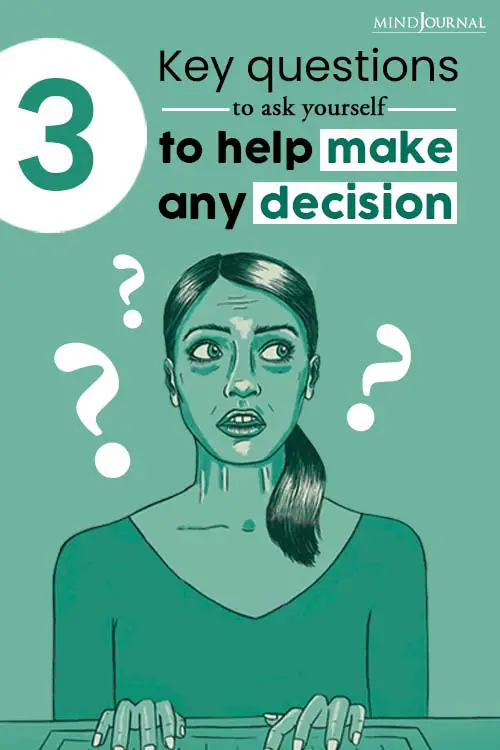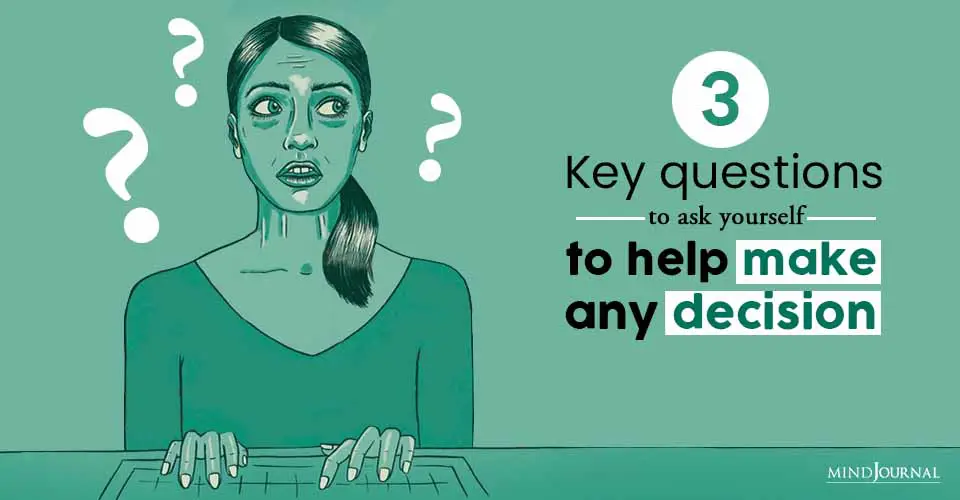Do you often struggle to make a decision be it career, job, relationship? Is there something you feel is very important but can’t figure out what to do? Ask yourself these three questions when you can’t make the decision?
Part of Kathy Caprino’s series “The Most Powerful You”
Back in 2004, I had left my 18-year corporate marketing career for good, and was in the process of a complete career transformation. I was studying to become a marriage and family therapist, and engrossed in my Master’s degree studies in that field. I had one year left to go in my studies and began obsessively worrying about the exact next steps I should take after graduation.
I’d go over and over questions in my mind, day and night, such as, “Should I work for a social services agency, or go out on my own?” “What about starting a private practice—can I afford this or should I take another route? “If I do proceed in that direction, should I launch a new venture with several of the other people in my program, or join an existing practice?” And “When should I start this process of creating a new practice?”
The questions kept coming, with no end in sight and no solid answers emerging. The options rolled around in my head continuously and gave me so much anxiety. I asked a good number of people what they thought, but it still didn’t resolve my confusion. I couldn’t quell my fears that I’d blow it and make a very bad move, in great part because I’d made a lot of wrong moves in my previous corporate life that really hurt me and led me far from who I wanted to be. For the life of me, I just couldn’t make a decision about what I should do.
During that time, I had a conversation with my friend and colleague Trudy Griswold and told her of my dilemma, and she shared some powerful advice that was life-changing for me. I follow this advice to this day and offer it any chance I get—to my clients, course members, colleagues, family and friends—whenever they too are in the swirl of indecision that is keeping them up at night and fueling chaos and anxiety.
Related: The Three Parts Of The Mind: How It Affects Your Decisions & Your Life
Here’s what Trudy shared and how I’ve interpreted and used it all these years:
When you’re in the middle of a period of gripping indecisiveness (what I now call “the swirl” thanks to a client who shared that term with me) about something you feel is very important but can’t figure out what to do, take a step back and examine your decision-making process as a whole. Ask yourself three key questions:
#1: Do I have enough information to make this decision?
So often, we go around and around about an issue or question, trying to make a decision when in fact, we simply don’t have a sufficient amount of data, research, experience or information to arrive at a successful conclusion or opinion. For me, for instance, I had a full year to go in my studies, including a long period of both an internal therapeutic internship (at the therapy clinic at my university) and an external intern role where I’d be working directly for a local social services agency providing therapeutic support on a wide range of client issues.
It turns out that after doing these yearlong internships, so much was answered for me. In short, I needed that year of additional training and learning before I could make any kind of sound decision on my next step after graduation.
Related: How To Stay Motivated — Ask These 6 Questions
#2: Do I have to make this decision now?
Secondly, is this a decision that must be made today or even this month or year? If not, stop agonizing. It’s not time yet to decide. Identify when you really do need to make this decision and put the actual due date on your calendar, then let it go.
Tell yourself you will revisit this when you need to and then release it. And assure yourself that you’ll be much farther down the path of knowledge and wisdom at the time you have to decide, than you are now.
It’s important though that you commit to doing what’s necessary to gain the added experience and knowledge you need to, to be well-informed about the issue when the time comes to make the decision. Identify what you need to learn in this period, and how you will gain this additional learning and know-how so that when the decision must be made, you’ll feel ready and equipped to do it.
Looking back, if I had made a decision about the post-graduate direction when I had been agonizing most about it (one year before graduating), it would have most likely been the wrong choice, given the degree of information and learning I was missing.
Related: Who Are You? based on Your Answer to The World’s Greatest Philosophical Questions?
#3: Is it any of your business anyway?
Finally, ask yourself if what you’re agonizing about is really something that’s in your control or something that’s truly in your bailiwick to weigh in on or act on. So often we become embroiled in thinking about other people’s lives and choices, we often forget that the issue at hand isn’t really any of our business in the first place. If our boundaries aren’t sufficient, for instance, we become enmeshed with others, taking on their challenges, choices, problems and pain as if it’s ours. And we have a very difficult time understanding where we end and others begin.
For instance, in the example above, I might go into a swirl when I hear that one of my Masters program classmates has decided to pursue a direction that I had rejected for myself. Then, I might become consumed with the idea that I’ve made a mistake in my thinking and should be pursuing this other person’s choice.
What other people do is interesting information, but it’s a mistake to assume that what others do is automatically the right choice for you. What they do is their business, not yours. Great decisions and sound choices for you need to be aligned with your unique values, your talents and passions, your goals for your life, who you like to collaborate with, the way in which you want to lead, and so much more.
Related: 50 Questions To Ask Yourself To Know Your Deepest Insecurities
The second aspect of this question touches on the common habit of obsessing about other people’s lives when really, we shouldn’t be involved. For instance, imagine that your friend shares that she’s been fired without cause. She asks your advice on what to do, and you give it, but you can’t stop thinking about what she should do and say and how you think she should react. You get swept up into an emotional vortex, somehow forgetting that it’s not your dilemma to solve.
In the end, when you’re struggling with making an important decision, it’s essential to pull the viewfinder back and examine more clearly the process you’re engaged in, in trying to land on the best course of action. Get the decision-making process straight, and your final decisions will satisfy and support you in a much deeper way in the future. And your mental health and emotional well-being will thank you as well.
Written by: Kathy Caprino Originally appeared on: Forbes.com Want to dramatically boost your power, confidence and impact in your career? Check out my Kathy Caprino's new book - The Most Powerful You: 7 Bravery-Boosting Paths to Career Bliss - today! To order in Australia and New Zealand, click here, in the UK, click here, and elsewhere outside North America, click here. Thank you!









Leave a Reply
You must be logged in to post a comment.